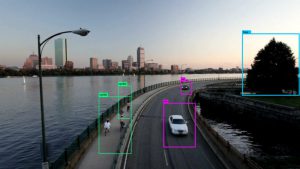
Neurala announced the launch of Bots Software Development Kit at Interdrone on Thursday. The kit will allow manufacturers to install artificial-intelligence “neural” software directly into their applications without the need for additional hardware. The enhanced applications can then equip drones for “autonomous flight, object recognition, visual following and visual inspection capabilities,” according to a Neurala press release.
“We are disrupting the market. You don’t need expensive equipment or server access to build autonomy and object recognition into a drone application,” said Neurala CEO Massimiliano Versace. “You can buy an industry standard drone components, add our software, and achieve state-of-the-art performance leveraging Deep Learning and AI in your drone out-of-the-box.”
Dubbed Brains for Bots, the new software kit will also work on several Internet-of-Things devices such as self-driving cars and robots. The company bases the Neurala Intelligence Engine on a solution it developed for NASA’s planetary exploration modules.
The company points out that several drone products claim to offer limited flight autonomy; however, those products require network assistance from a connected smart device or via cell-phone or other radio signal.
“The problem for these competitive solutions is that communications delays and reliability issues make true autonomy unusable in many situations,” a company spokesperson stated.
Neurala says Brains for Bots will allow drones to:
Remember objects, people or groups of objects. Instant training can be performed by the end user to learn a particular object or person. For more robust object categories, groups of objects can be pre-trained and, if desired, personalized by the end user.
Identify learned objects and learned object classes when it sees them anywhere in the real-time video stream. The SDK provides the label name given to the object or object class, along with a likelihood estimate.
Recognize and provide the location of learned objects or object classes when it sees them anywhere in the real-time video stream.
Track the movement of recognized objects from frame to frame in the live video stream with updated coordinates. Information can be easily converted using the supplied tools to left/right, up/down and forward/back motor commands.
Another startup, Teal Drone has already integrated Brains for Bots in a configuration that allows its models to follow people or objects using telemetry from on-board cameras.
Last year, Neurala released Selfie Dronie – a platform that eliminates the need to buy a specialized selfie drone in order to shoot hands-free video. The software uses an AI/deep-learning module that will empower Parrot Bebop and Bebop 2 drones to capture hands-free videos and follow a subject autonomously.
Jason is a longstanding contributor to DroneLife with an avid interest in all things tech. He focuses on anti-drone technologies and the public safety sector; police, fire, and search and rescue.
Beginning his career as a journalist in 1996, Jason has since written and edited thousands of engaging news articles, blog posts, press releases and online content.
Email Jason
TWITTER:@JasonPReagan
Subscribe to DroneLife here.